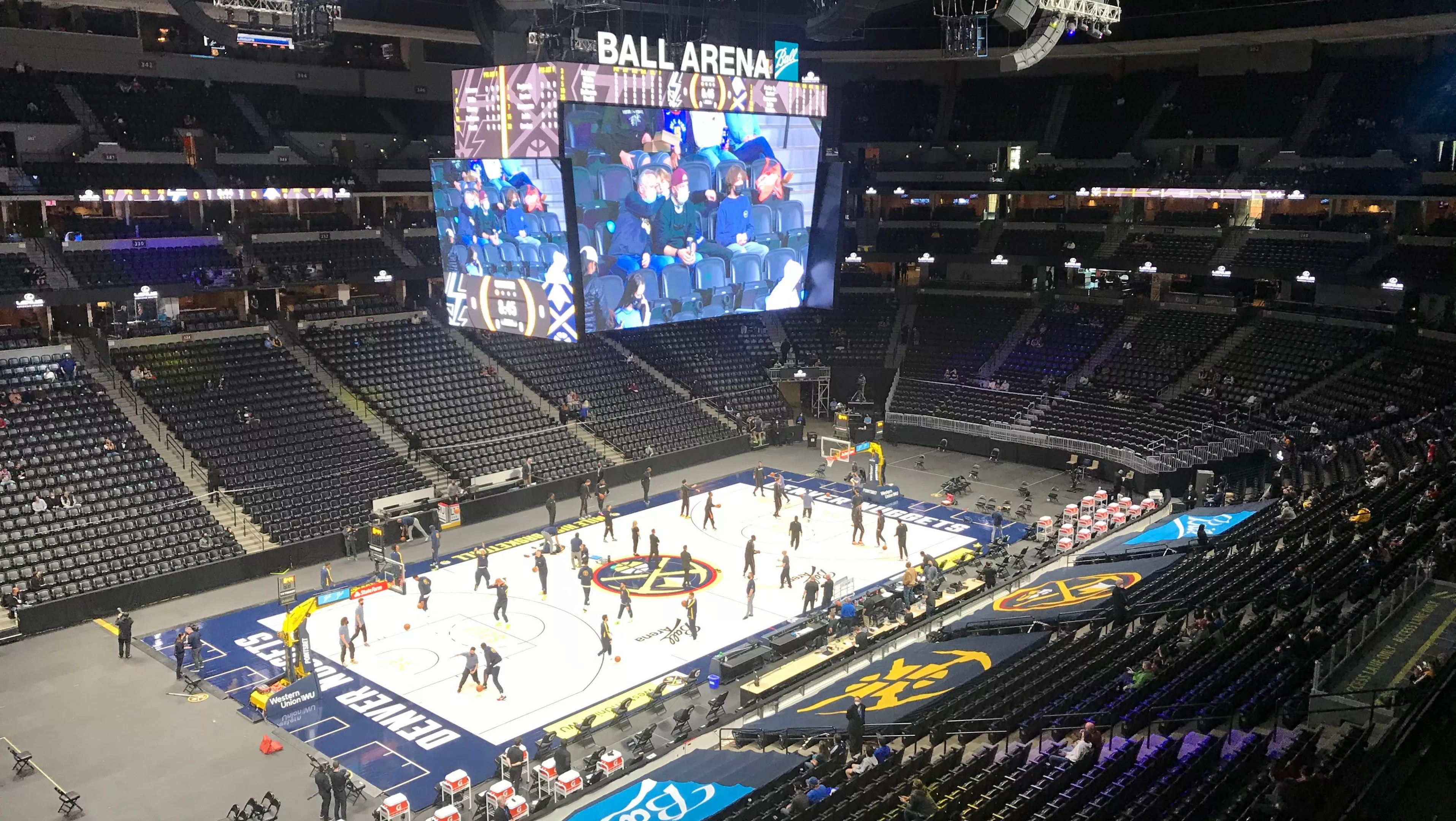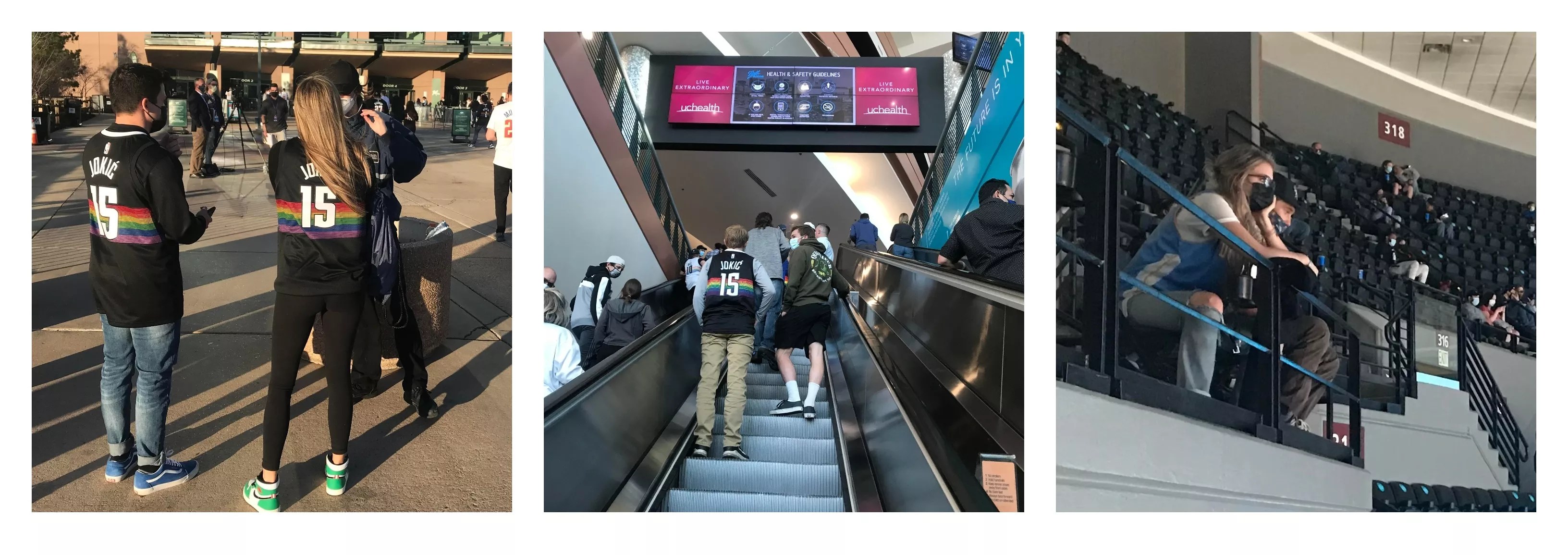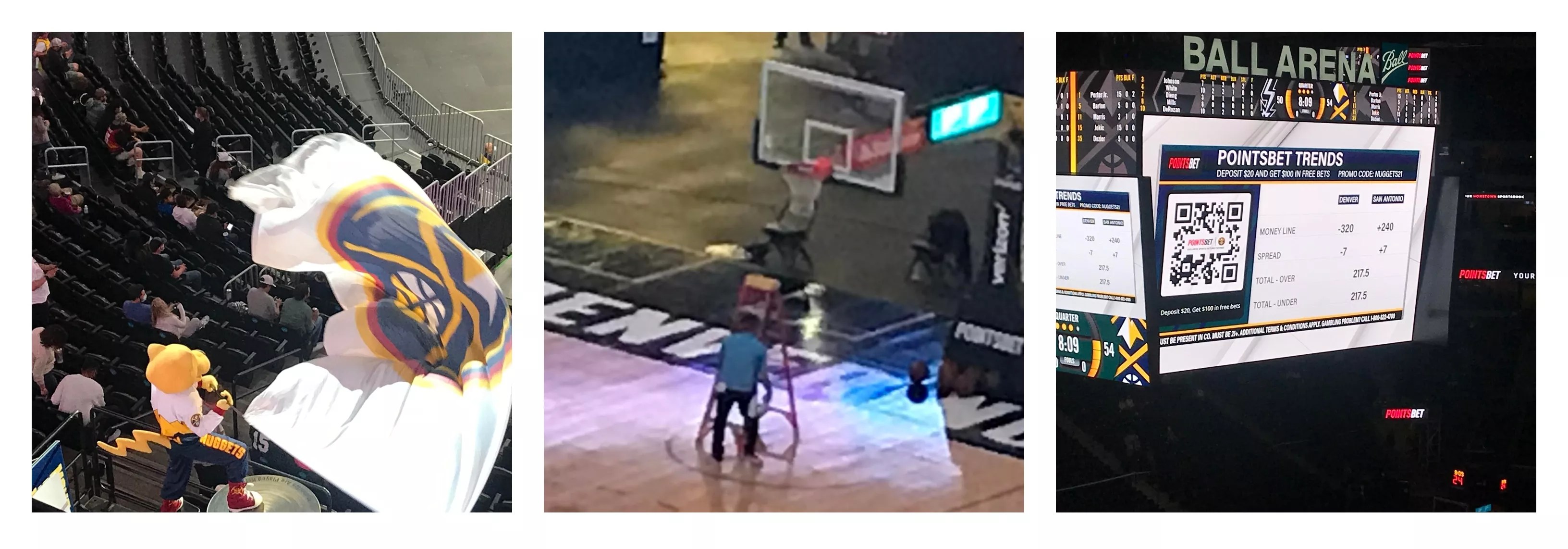
Photo by Michael Roberts

Audio By Carbonatix
Over a year into the pandemic – and despite worsening COVID-19 data and an explosion of outbreaks in the state – more indoor events are starting to roll out now, including last night’s Denver Nuggets game at Ball Arena, which I attended with my daughter Lora, who’d bought us tickets for my birthday.
The experience was great – and also weird as hell.
The last time I was in this venue’s parking lot, in July 2020, the arena was still called the Pepsi Center, and I was getting tested for the novel coronavirus along with hundreds of other people stuck in a massive line. But since the Colorado Department of Public Health and Environment is currently limiting attendance to 4,050 people, or roughly 22 percent of the Ball Arena’s capacity, finding a space (after paying $20 for the privilege) was a snap. We were able to park in the part of the lot typically reserved for season-ticket holders and general high rollers.
Before we could get to the front doors, however, we were met by a staffer, who told Lora she couldn’t bring her purse inside (we locked it in the car) and detailed the entry procedures: We had to use our phones to scan a QR code that took us to a website, where we clicked a box pledging to follow safety procedures instituted by the Ball Arena crew – after which a green checkmark graphic popped up. Only after showing the green checkmark were we allowed to proceed – or at least that was the idea: At the entrance, an employee asked us if we’d signed up, but didn’t really glance at our phones.
After our tickets were scanned (no paper ones are currently allowed), we continued on to the metal detectors. But instead of dumping all of our belongings in a common trough, we instead were instructed to take them out of our pockets and hold them overhead as we walked through. It was hard to tell if the security staffers were looking at all the crap in our hands or our presumably empty pockets.

From left: The check-in procedure; an attempt at social distancing on an escalator; spectators were widely spaced in the seating area.
Photos by Michael Roberts
Still, we got through and spilled into the lobby, which was busy, but less so than at an old-fashioned sellout. Everyone we saw was masked – a requirement – and if six feet of physical distancing wasn’t possible, less space-invading took place than would have happened before COVID-19 was a thing.
Our seats were in the upper deck, just behind a railing – or so we thought. (More on that later.) As we settled in, we looked at the players warming up on the floor and the fans scattered throughout the seating area, with the exception of the eight or so rows closest to the teams’ benches (they were covered with logo-emblazoned tarps). No one else sat in our row; the closest people were at least thirty feet away on either side.
Moments later, Denver treasure Kyle Speller announced the players, grumbling out the Spurs squad’s monikers with maximum disinterest before celebrating new Nuggets acquisition Aaron Gordon, as well as MVP candidate Nikola Jokic and fellow starters Will Barton, Michael Porter Jr. and Facundo Campazzo, subbing for Jamal Murray, who was out with knee soreness that no doubt would have been exacerbated by the outfit’s brutal schedule; the Spurs contest was one of back-to-back games, and the third in four nights.
Following the singing of the national anthem, the bout tipped off, and if the action on the court seemed perfectly normal, many of the elements around it had clearly been altered because of the pandemic.
Super-mascot Rocky is generally all over the arena, high-fiving fans, dishing with players on the court and every so often temporarily stealing the babies of courtside families. But because of COVID, he was essentially confined to a small space near the Nuggets dancers, who also had to stay where they were. Rocky’s style was cramped, to put it mildly; instead of executing his trademark backwards half-court shots, he sat at a table and doodled messages on a white board using some extremely iffy markers. It was as if he’d accidentally switched sports and found himself in the penalty box.
Likewise, there were no T-shirt cannons, staffers hurling balls and other giveaways into the stands, or even servers pitching beer or snacks. Those fans who were hungry or thirsty had to go to the concession stand, where prices seemed to have been jacked up. When Lora was asked to pay $14 for a tall Blue Moon, her jaw nearly dropped below her facial covering.

From left: Super-mascot Rocky was penned up most of the night; the backboards and rims were sanitized at halftime; one of many ultra-aggressive PointsBet promotions.
Photos by Michael Roberts
Shortly after her return, a Nuggets staffer approached us and said that we were in the handicapped row and had to move – or at least that’s what we thought he said. In fact, he moved us into handicapped seating – a pair of folding chairs a few feet away from a couple in their sixties who seemed to have stepped out of a MAGA rally. They defiantly wore their paper masks on their chins, as if daring an usher to tell them to don them properly (none did), and reacted indignantly to any display of liberalism. The female half of the pair shook her head disdainfully at Ball Corporation messaging about aluminum recycling, as if the idea that every can doesn’t end up at the bottom of the ocean made her deeply angry, and actually flipped off a video in which Altitude Sports’ Vic Lombardi explained the safety protocols.
Her bitterness struck me as hilarious. But it also made me happy I’d chosen to double-mask.
Otherwise, the Ball Arena staff went the extra mile to keep the venue as clean as possible. Lora visited the bathroom twice, and each time, an employee was on hand to sanitize immediately afterward. At halftime, another crew member sanitized the rims and backboards on the court – which at least gave attendees something to watch. Instead of highlighting dancers, games between junior basketballers, special guest performers or the like, the gap between the second and third quarters was filled by video of DJ Paws spinning vinyl and random folks dancing near their seats, plus aggressive advertising for PointsBet, the Nuggets’ gambling partner.
Still, we were able to do something we hadn’t done in more than a year – watch an NBA game in person from start to finish. The undermanned and clearly fatigued Nuggets initially appeared to be sluggish and disinterested, and the Spurs’ cause was abetted by ridiculous officiating that caused Denver coach Michael Malone to erupt, after which he was ejected. Such actions usually tend to serve as a wake-up call, and the Nuggets managed to take a small lead before the second period expired, only to give it all up in a 12-2 San Antonio run that started the third. But the Nugs’ superior personnel eventually took control thanks in part to unlikely heroes such as returning center JaVale McGee, who vacillated between doofiness (he fell down during his first appearance) and dominance (a thunderous dunk served as an exclamation point). In the end, the Nuggets won 106-96 after some extended garbage time that even allowed bench-sitting fan favorite Bol Bol to get some touches; he scored one point.
After the final buzzer sounded and McGee talked to the throng (he boasted in endearing fashion about his “dynamic vertical spacing”), the happy fans headed for the exits – and this time, the crowding was more pronounced.
We breathed easier once we were outside again. And under our masks, we were smiling.